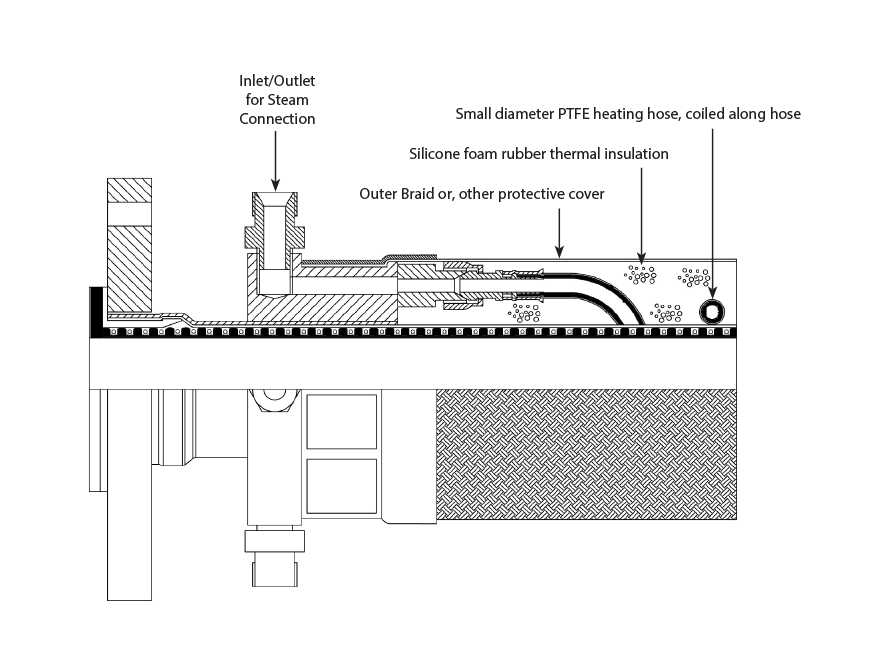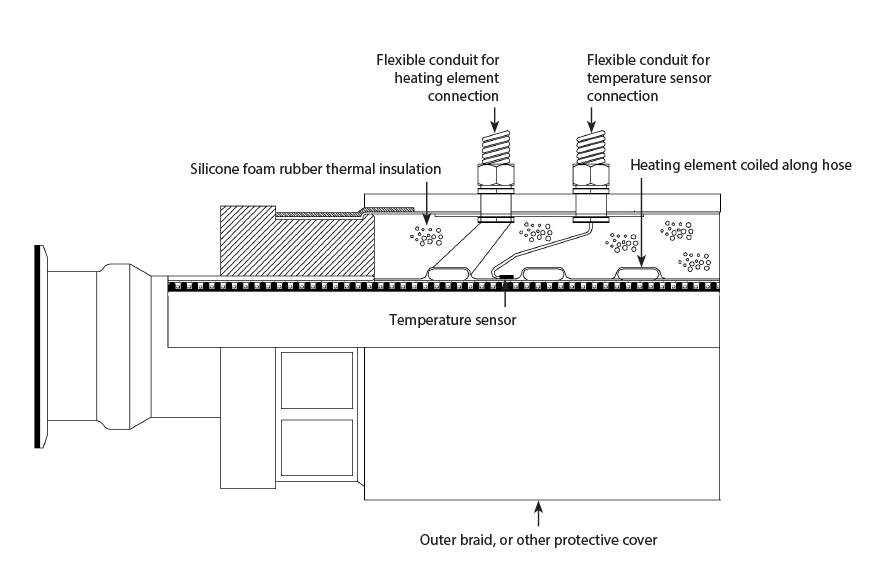Heated Hose |
Steam Heated HosePurposeFor use in applications where the temperature of the process fluid must be maintained as it passes through the hose. This is usually required to prevent solidification or an increase in fluid viscosity. Steam heating is preferred to electrical heating in some applications for reasons of availability or safety, but is less controllable. DescriptionThe heating element comprises a small diameter PTFE heating hose, 1/4†or 3/8†bore size, with a single SS wire braid. This is spirally wrapped around the hose, with inlet and outlet ports attached, either both at one end or at opposite ends of the hose assembly. In the case of hose assemblies longer than 3 meters, it is usual to have several heating hoses with inlet ports at opposite ends and along the hose. This reduces the effects of temperature loss over the length of the Hose Assembly. The thermal insulation is usually closed-cell silicone foam rubber. The outer cover is a SS wire braid with a rubber cover if necessary. DesignEach hose is custom designed and built to suit the requirements of the particular application. The following information is therefore required:
SpecificationsAs for Bioflex Ultra GP, SS in Specifications, except that the minimum bend radius is tripled, and the outside diameter and weight are significantly increased in line with the particular design. Limitations1†PTFE lined PN10 flange spigots on heated hoses can only have a maximum flare diameter of 50mm, not 63mm. If the hose is “hangingâ€, straight or at 90Ëš, under its own weight, special construction is required, so advise Aflex Hose accordingly. Minimum CH Hose Assembly Length 750mm. CH Hose Assembly
Electrically Heated HosePurposeFor use in applications where the temperature of the process fluid must be regulated as it passes through the hose. In some applications, an additional ‘melt out’ facility may also be required. DescriptionThe heating element comprises either a resistance or self-regulating element spirally wrapped around the hose assembly. Self regulating elements may require a sensor and controller if a specific maintain temperature is required. Please consult Aflex Hose for clarification. Resistance element heated hoses usually also require a temperature sensor to be built in to the construction and must be used in conjunction with a temperature controller. The power leads and (if applicable) temperature sensor leads emerge from the hose assembly at one end, through glands and conduits. The thermal insulation is foam rubber, silicone foam rubber for temperatures above 80ËšC (176ËšF). The outer cover may be a polypropylene yarn or SS wire braid with a rubber cover if necessary. DesignEach hose is custom designed and built. Application details must be supplied by filling in an “ETH Hose Questionnaireâ€, available from Aflex Hose. Generally, for Hazardous Areas, particularly “ZONE 1â€, the Self Regulating type of heating element is employed, with or without a temperature sensor and control, and flameproof glands and conduit are also required. The watts per meter of the heating element, the pitch of the spiral on the hose, and the thickness of the thermal insulation are all calculated in accordance with established formulae to give the required maintained temperature. SpecificationsAs for Bioflex Ultra GP, SS in Specifications, except that the Minimum Bend Radius is tripled and the outside diameter and weight are significantly increased in line with the particular design. Maximum ETH Hose Assembly Lengths are as Bioflex GP, SS. Limitations1†PTFE lined PN10 flange spigots on heated hoses can only have a maximum flare diameter of 50mm, not 63mm. If the hose is “hangingâ€, straight or at 90Ëš, under its own weight, special construction is required, so advise Aflex Hose accordingly. Minimum ETH Hose Assembly Length, when collars are used 750mm. ETH Hose Assembly |
Our Commitment to Quality
Above all else, Carolina Components Group is committed to producing components of the highest quality.
Our customers can be assured that the products that they receive meet their stringent quality standards.
Carolina Components Group is a Member or Affiliate of:



